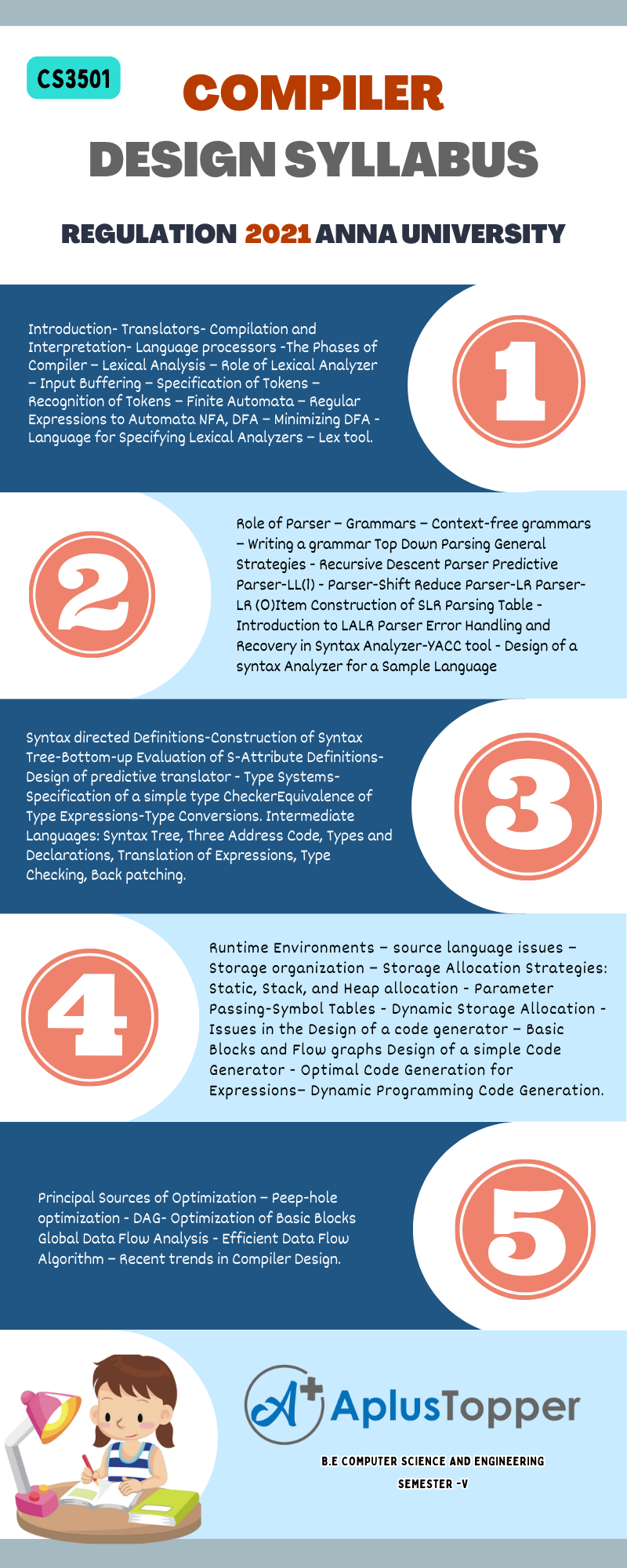Anna University, Subject code – CS3501, deals with the B.E Computer Science and Engineering Semester -V Compiler Design syllabus regulation 2021 relating to affiliated institutions. From here, Students can get assistance in preparing notes to excel in academic performance.
We include every topic of the Compiler Design Syllabus, to understand the subject very well. It will help you to improve your idea of syllabus of CS3501-Compiler Design Syllabus on your finger tips to go ahead in a clear path of preparation. In this following article Compiler Design Syllabus, will help you, Hope you share with your friends.
If you want to know more about the syllabus of B.E Computer Science and Engineering connected to an affiliated institution’s under four-year undergraduate degree programme. We provide you with a detailed Year-wise, semester-wise, and Subject-wise syllabus in the following link B.E Computer Science and Engineering Syllabus Anna University, Regulation 2021.
Aim Of Concept:
- To learn the various phases of compiler.
- To learn the various parsing techniques.
- To understand intermediate code generation and run-time environment.
- To learn to implement the front-end of the compiler.
- To learn to implement code generator.
- To learn to implement code optimization.
CS3501- Compiler Design Syllabus
Unit I: Introduction To Compilers & Lexical Analysis
Introduction- Translators- Compilation and Interpretation- Language processors -The Phases of Compiler – Lexical Analysis – Role of Lexical Analyzer – Input Buffering – Specification of Tokens – Recognition of Tokens – Finite Automata – Regular Expressions to Automata NFA, DFA – Minimizing DFA – Language for Specifying Lexical Analyzers – Lex tool.
Unit II: Syntax Analysis
Role of Parser – Grammars – Context-free grammars – Writing a grammar Top Down Parsing General Strategies – Recursive Descent Parser Predictive Parser-LL(1) – Parser-Shift Reduce Parser-LR Parser- LR (0)Item Construction of SLR Parsing Table – Introduction to LALR Parser Error Handling and Recovery in Syntax Analyzer-YACC tool – Design of a syntax Analyzer for a Sample Language
Unit III: Syntax Directed Translation & Intermediate Code Generation
Syntax directed Definitions-Construction of Syntax Tree-Bottom-up Evaluation of S-Attribute Definitions- Design of predictive translator – Type Systems-Specification of a simple type CheckerEquivalence of Type Expressions-Type Conversions. Intermediate Languages: Syntax Tree, Three Address Code, Types and Declarations, Translation of Expressions, Type Checking, Back patching.
Unit IV: Run-Time Environment And Code Generation
Runtime Environments – source language issues – Storage organization – Storage Allocation Strategies: Static, Stack, and Heap allocation – Parameter Passing-Symbol Tables – Dynamic Storage Allocation – Issues in the Design of a code generator – Basic Blocks and Flow graphs Design of a simple Code Generator – Optimal Code Generation for Expressions– Dynamic Programming Code Generation.

Unit V: Code Optimization
Principal Sources of Optimization – Peep-hole optimization – DAG- Optimization of Basic Blocks Global Data Flow Analysis – Efficient Data Flow Algorithm – Recent trends in Compiler Design.
List Of Experiments:
- Using the LEX tool, Develop a lexical analyzer to recognize a few patterns in C. (Ex. identifiers, constants, comments, operators etc.). Create a symbol table, while recognizing identifiers.
- Implement a Lexical Analyzer using LEX Tool
- Generate YACC specification for a few syntactic categories.
a. Program to recognize a valid arithmetic expression that uses operator +, -, *, and /.
b. Program to recognize a valid variable which starts with a letter followed by any number of letters or digits.
c. Program to recognize a valid control structures syntax of C language (For loop, while loop, if-else, if-else-if, switch-case, etc.).
d. Implementation of calculator using LEX and YACC - Generate three address code for a simple program using LEX and YACC.
- Implement type checking using Lex and Yacc.
- Implement simple code optimization techniques (Constant folding, Strength reduction and Algebraic transformation)
- Implement back-end of the compiler for which the three address code is given as input and the 8086 assembly language code is produced as output.
Text Book:
- Alfred V. Aho, Monica S. Lam, Ravi Sethi, Jeffrey D. Ullman, “Compilers: Principles, Techniques and Tools”, Second Edition, Pearson Education, 2009.
References:
- Randy Allen, Ken Kennedy, Optimizing Compilers for Modern Architectures: A Dependence based Approach, Morgan Kaufmann Publishers, 2002.
- Steven S. Muchnick, Advanced Compiler Design and Implementation‖, Morgan Kaufmann Publishers – Elsevier Science, India, Indian Reprint 2003.
- Keith D Cooper and Linda Torczon, Engineering a Compiler‖, Morgan Kaufmann Publishers Elsevier Science, 2004.
- V. Raghavan, Principles of Compiler Design‖, Tata McGraw Hill Education Publishers, 2010.
- Allen I. Holub, Compiler Design in C‖, Prentice-Hall Software Series, 1993.
Related Posts On Semester -V:
